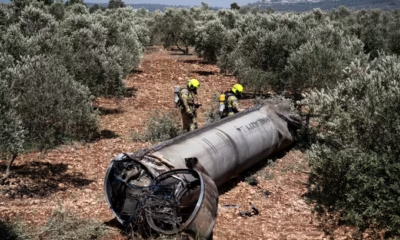Business
Iran To Provide Infrastructure For Nigeria’s Oil, Gas Development – Ambassador

The Iranian Government has expressed its readiness to collaborate in developing Nigeria’s oil and gas downstream division.
The Iranian Ambassador to Nigeria, Muhammad Alibak, made this known when he hosted Rep. Ikenga Ugochinyere (PDP-Imo), Chairman, House Committee on Downstream Petroleum and Rep. Aliyu Mustapha (PDP-Kaduna state) in Abuja.
The ambassador explained that the assistance would include in refineries and other related infrastructure.
He said that Iran was ready to support the Nigerian Government in addressing its energy challenges through collaborative investment and cooperation.
The ambassador expressed Iran’s enthusiasm to bolster Nigeria’s oil and gas sector and explore alternative energy sources.
READ ALSO: How My Boyfriend, Native Doctor Made Me Homeless — Anambra Orphan
Alibak also aid that areas of collaboration included Compressed Natural Gas (CNG) projects, refinery improvements, petrochemical ventures, and impactful exploration initiatives.
He expressed the unwavering commitment of Iran, exemplified through a Memorandum of Understanding (MoU), previously signed by the former Minister of Petroleum Resources, Mr Timpre Slyva.
The ambassador also highlighted subsequent correspondence from Iran’s current Oil Minister, demonstrating their determination to collaborate closely with Nigeria.
In his remarks, Ugochinyere said that the purpose of their visit was to solidify deeper cooperation based on Iran’s long-standing willingness to contribute to Nigeria’s growth and expansion in the downstream sector.
READ ALSO: Mob Rescues Two Girls From Suspected Ritualist, Sets Him Ablaze
He said sequel to the enacted Petroleum Industry Act (PlA), “there are many opportunities within the downstream and midstream oil domains.”
The lawmaker sought enhanced investment collaboration with Iran in terms of technology transfer that would fortify the ongoing evolution in the oil and gas sector.
Ugochinyere underscored the significance of refining alternative energy sources, advancing the CNG project, accelerating petrochemical initiatives, and boosting profitable exploration endeavours.
The chairman commended Iran’s successful utilisation of gas resources, leading to widespread connectivity to refined gas and enabling economic growth.
He commended Iran’s resilience in maintaining local petroleum refining and expanding refining capacity even amidst global economic sanctions.
READ ALSO: Delta Police Foil Abduction, Rescue Victim
Ugochinyere said that closer collaboration with Iran, a country that successfully overcame challenges including global sanctions, could strengthen Nigeria’s energy security, exploration activities, local refining, and overall industry growth.
The chairman assured that the Nigerian Parliament would vigilantly oversee the implementation of the PlA, ensuring its intentions so upheld with unwavering consistency.
He encouraged Iranian investors and oil companies to capitalise on the transparent and competitive market environment, leveraging the newfound stability in Nigeria’s oil and gas sector and invest heavily.
Also speaking, Mustapha expressed the urgent need for Nigeria to transition from exporting crude materials to refining locally.
“This transformation would pave the way for job creation, forex generation, energy security, and greater economic stability.
“This is further made possible given the removal of subsidies and the resulting volatility of Nigeria’s oil and gas sector and the potential opportunities presented by the PIA,” he said.
Business
CBN Directs Nigerian Banks To Withdraw Misleading Advertisement

The Central Bank of Nigeria (CBN) has directed Nigerian banks, payment service banks and other financial institutions to immediately withdraw all advertisements that violate consumer-protection rules.
The directive, issued in a circular dated Thursday and signed by Olubunmi Ayodele-Oni, director of the CBN’s compliance department, followed a review of marketing practices in the financial sector.
The apex bank said the assessment revealed inconsistencies in how institutions apply disclosure, transparency and fair-marketing requirements.
READ ALSO:CBN Retains Interest Rate At 27%
The CBN ordered the removal of all non-compliant adverts and warned that future promotional materials must be factual, balanced and transparent.
It banned misleading claims, exaggerated benefits, incomplete information, unaudited financial results and comparative language that could de-market competitors.
The regulator of Nigeria’s financial sector also prohibited chance-based promotional inducements such as lotteries, prize draws and lucky dips.
Accordingly, institutions submitting adverts for prior notification must now include campaign timelines, creative materials, target audience details and written confirmation of internal legal and compliance clearance, along with proof that the underlying product has CBN approval.
READ ALSO:JUST IN: EFCC Summons Ex-AGF Malami For Questioning
The bank clarified that such notifications are only for monitoring and do not amount to approval.
All affected institutions must file a compliance attestation within 30 days, signed by the chief executive and compliance leads.
The CBN added that beginning January 2026, it will conduct a follow-up review and apply sanctions for violations under BOFIA 2020 and the Consumer Protection Regulations.
Business
Fourteen Nigerian Banks Yet To Meet CBN’s Recapitalisation Ahead Of Deadline

No fewer than 14 Nigerian commercial banks are yet to meet the Central Bank of Nigeria’s recapitalisation requirement as the 31st March 2026 deadline inches closer.
This follows CBN Governor, Olayemi Cardoso’s announcement on Tuesday that sixteen Nigerian banks have met their recapitalisation requirement ahead of the apex bank’s March 2026 deadline.
DAILY POST reports that Cardoso disclosed this in a statement after the bank’s 303rd Monetary Policy Committee in Abuja.
According to Cardoso, the development indicates that there is financial soundness in the country’s financial banking system.
READ ALSO:CBN Retains Interest Rate At 27%
MPC had been urged by banks to ensure a successful implementation of the recapitalisation process.
“The committee noted with satisfaction the sustained resilience of the banking system, with most financial soundness indicators remaining within regulatory thresholds,” Cardoso said.
“Acknowledged the substantial progress in the ongoing recapitalisation programme, with 16 banks achieving full compliance with the revised capital requirements.
“The committee thus urged the Bank to ensure a successful implementation and conclusion of the programme, among other domestic developments,” Cardoso said.
READ ALSO:Account For N3tn Or Face Legal Action, SERAP Tells CBN
This means that two additional Nigerian banks have been added to the list of banks which have complied with the apex bank recapitalisation requirement in the last two months.
Recall that Cardoso, in the 302nd MPC meeting, announced that only fourteen banks have met the recapitalisation requirement.
CBN records as of 2024 showed that the country has thirteen commercial banks, five merchant banks and seven financial holdings companies.
Earlier, a report emerged that Access Bank, Zenith Bank, GTBank, Wema Bank, Jaiz Bank, Stanbic IBTC, and others have already met CBN’s recapitalisation requirement.
CBN in March directed commercial banks with international authorisation to increase their capital base to N500 billion, while those with national licences must raise to N200 billion.
Business
CBN Retains Interest Rate At 27%

The Monetary Policy Committee of the Central Bank of Nigeria has voted to retain the benchmark interest rate at 27 per cent.
CBN Governor, Olayemi Cardoso, announced the decision on Tuesday following the apex bank’s 303rd MPC meeting in Abuja.
Cardoso stated that the committee also resolved to keep all other monetary policy indicators unchanged.
READ ALSO:CBN Issues Directive Clarifying Holding Companies’ Minimum Capital
He noted that the Cash Reserve Ratio (CRR) remains at 45 per cent for commercial banks and 16 per cent for merchant banks, while the 75 per cent CRR on non-TSA public sector deposits was equally maintained.
Cardoso added that the Liquidity Ratio was retained at 30 per cent, and the Standing Facilities Corridor was adjusted to +50/-450 basis points around the Monetary Policy Rate.
The decision comes as Nigeria records its seventh consecutive month of declining inflation, which eased to 16.05 per cent in September 2025.

 Metro3 days ago
Metro3 days agoJUST IN: Again, Terrorists Storm Kwara Community, Kidnap Pregnant Woman, 10 Children, Others

 News4 days ago
News4 days agoBREAKING: South-West Governors Hold Security Meeting In Ibadan

 News5 days ago
News5 days agoN6trn: Court Orders Tinubu To Publish NDDC Audit Report, Name Indicted Officials

 News4 days ago
News4 days agoArmy Releases List Of Shortlisted Candidates For SSC Course

 News4 days ago
News4 days agoJimmy Cliff, Jamaican Reggae Legend, Cultural Icon, Is Dead

 Politics4 days ago
Politics4 days agoJUST IN: Atiku Officially Joins ADC, Registers With Party In Adamawa

 News2 days ago
News2 days agoHow To Access Your Pension Before Retirement

 News2 days ago
News2 days agoBREAKING: Tinubu Declares Nationwide Security Emergency, Orders Armed Forces To Recruit More Personnel

 Metro4 days ago
Metro4 days agoBandits Claim Kebbi, Niger Abductions, Vow More Attacks On Soldiers, Politicians [VIDEO]

 Headline2 days ago
Headline2 days agoCoup In Guinea-Bissau? Soldiers Deployed Near Presidential Palace After Gunfire






























